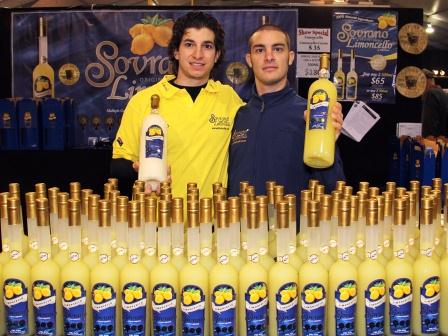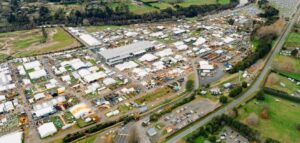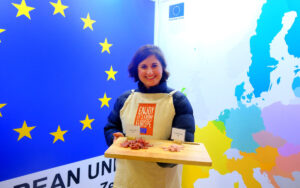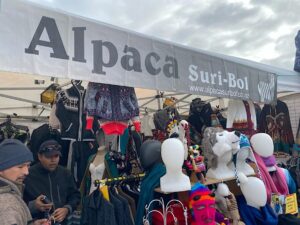Limoncello – nothing sour about it
This year there are two limoncello producers at the Fieldays. Don Rowe visits them both.
The Kiwi Best Kitchen houses all manner of boutique and niche food stalls. There are dried meat salesman, honeyed liqueur merchants and purveyors of fine cheese.
And then there are the suppliers of Italy’s hidden gem, limoncello.
Limoncello is an alcoholic liqueur made from the zest of the lemon.
Two exhibitors sell limoncello exclusively.

Italian importers Stefano and Paolo Loggia are fifth generation limoncello producers. Paolo has been in New Zealand for seven years, and is Sovrano Limoncello’s spokesman at the Fieldays.
“Our recipe is 150 years old. Since 2010, we have been judged the best limoncello in the world,” he said, with all the enthusiasm of a true Italian.
The wall of the Loggia stall is adorned with awards. “In 2014, we won the gold medal in California. We were the only ones to be awarded a double gold medal at the San Francisco Spirit Awards; no limoncello has ever won a double gold medal.”
The Loggia brew uses lemons exclusively from their home base of Kerikeri.
“We are trying to keep it as Kiwi as possible, but our recipe is Italian. It is a family recipe, a family business, and we have been in this business for five generations.”
The recipe, handed down from great-great-great grandmother Loggia, contains some secrets.
I asked Loggia to disclose a few for the sake of the news.
“I can’t,” he said. “You know what would happen.”
I mentioned I had tried my hand at making my own limoncello. Loggia wasn’t impressed.
“This is not a recipe from the internet. For example, we do not use vodka. You cannot use a Russian ingredient in an Italian recipe.”

When it became clear I would not be offered another sample, I took my leave of the Loggia stall and headed to competitors Soprano Limoncello.
Just like Sovrano, Soprano Limoncello is a family run affair.
The Chew family from the Kapiti Coast follow an Italian recipe given to them by the previous owner, an Italian who produced the drink as a boutique product.
I spoke with mum Ingrid while her daughter minded the stall.
“We peel the lemons ourselves and hand-craft the limoncello right to the end stage,” she told me.
Even the aesthetic is a product of the family.
“We wanted something that was clean and striking, and how we saw limoncello to be,” explained Chew. “It’s a mix between having something traditional and authentic but still appealing to the younger generation.
“We’re the new players in the market, but I think competition is healthy. It gives people an opportunity to decide what they want to drink, and just like wine it’s a preference thing.
“We have a great following of people that love our limoncello, but we haven’t entered any competitions. Really our drive is to make sure that we have a good product, that we get the packaging right and market accordingly.”
The Chews plan on starting their own lemon grove.
“That’s something we’re going to develop. It takes time, but the Kapiti Coast is certainly a good place to grow lemons.”
I left the Kiwi Best Kitchen and considered what I had learned from my time with the Loggias and Chews.
While the two competitors are different at first glance, they share the bonds of family and a real, tangible passion for the lemon.
Not bad for a zesty little fruit.




